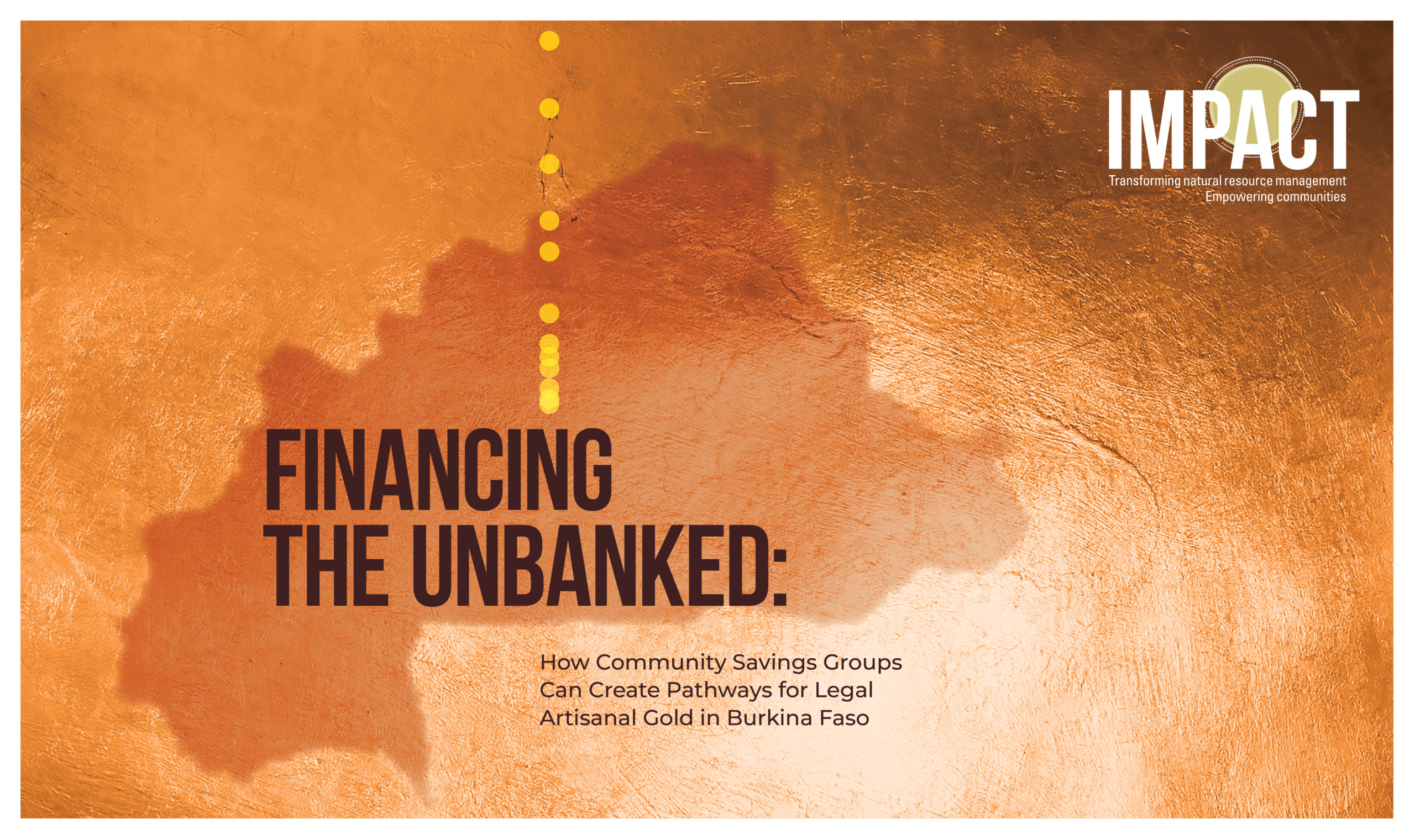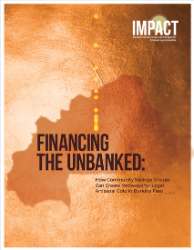New report highlights how access to finance for communities is a key component to the success of any formalization and responsible sourcing project
Ottawa, Canada—Thursday, March 30, 2023
IMPACT’s newest report reveals how artisanal gold miners and traders are stuck in a cycle of illegality, without access to formal financial institutions, leaving them dependent on informal and predatory lenders.
Any efforts to introduce artisanal gold mining communities to formal and legal trade must be accompanied with access to financing, such as through community savings groups which can serve as an effective first entry-point for financial inclusion.
In its latest report, Financing the Unbanked: How Community Savings Groups Can Create Pathways for Legal Artisanal Gold in Burkina Faso, IMPACT explores the role of financing to support formalization and end the illicit gold trade. The report examines the case of Burkina Faso’s artisanal gold mining sector, but findings can be applied to contexts worldwide.
Many artisanal miners and traders have no access to banks yet require pre-financing to pay for their basic needs during gold mining or to help manage cash flow during gold trading cycles. As a result, they turn to informal and potentially predatory lenders—often other supply chain actors—which in turn sees them red-flagged by formal finance and market actors. This leaves artisanal miners and traders dependent on informal financing.
This means that while actors in the artisanal gold supply chain may want to enter the legal, formal market—they are pushed into a cycle of informality and illicit trade.
“While much effort has been made to open the door to the international market for artisanal gold miners and traders, many of the communities we work with are still unbanked and lack accessible financing options. Financial inclusion is key for supply chain actors to move away from being simply formalized on paper and truly on the path towards legal trade,” said Kady Seguin, IMPACT’s Policy and Research Director.
IMPACT surveyed five artisanal mining communities across Burkina Faso’s Centre-Ouest and Centre-Nord regions. Less than 7 percent of men and 3 percent of women had a bank account—compared to the estimated 25 percent national average. None of the women in the artisanal mining communities had ever taken a loan from a formal financial institution. When asked about their financing, women and men named family members, friends, or supply chains actors.
Women miners are disproportionately affected by the inability to access finance. Without financing, women are not able to improve their mining activities and increase their income. When financing options do become available, IMPACT found that women miners are often left behind, leaving them to continue to operate informally—reinforcing gender inequality and traditional power imbalances.
IMPACT identified community savings groups, like Village Savings and Loans Associations (VSLAs) to be effective entry-level solutions for financial inclusion of artisanal miners, especially women. In a VSLA model, community members meet regularly to put money into their association’s savings and to loan their growing funds to members. In contrast to microfinance institutions, the interest paid on the credit goes back into the communal pot, so members see their savings increase over time. At the end of a one-year cycle, each member receives their share of savings, including any profit from interest gained on loans.
IMPACT was one of the first to introduce VSLAs to artisanal gold mining communities through its AFECCOR project. IMPACT supported the creation of 50 VSLAs in Democratic Republic of Congo throughout 2018 and 54 groups in Burkina Faso throughout 2022. Across the two countries, more than 2,700 women and men have saved over $176,000 USD.
“Based on our experience and findings, community savings groups like Village Savings and Loans Associations have the power to support economic security and resilience, but also legal trade. These savings groups can become the first milestone for mining associations or women’s groups in formalization, bridging their entry to the legal market,” said Seguin.
The report found that community savings groups can evolve to become more formalized mining groups or larger collectives of artisanal miners, and specifically women’s groups. IMPACT observed that community-led finance was a precursor for many women’s mining associations. The creation of the first women artisanal miner’s association in DRC’s Ituri Province was spurred by the women members of VSLAs in their respective communities.
The report encourages financial inclusion to become a pillar of formalization projects. It recommends introducing artisanal mining communities to entry-level financing options, such as community savings groups, to build financial literacy and eventually access new forms of formal financing.
Download the full report here.
-30-
Note to editors:
IMPACT’s AFECCOR project supports women and men in artisanal gold mining communities to access savings and credit. Miners use their savings and credit to invest in alternative livelihoods and income generating activities, save for emergencies, and decrease their reliance on informal credit networks. IMPACT launched the first AFECCOR project in 2017 in Democratic Republic of Congo. It has since been expanded to Burkina Faso in 2021 and Mali in 2022. Read the latest project results.
Media contact:
Zuzia Danielski, Communications Director
zdanielski@impacttransform.org | +1-613-263-0661
IMPACT transforms how natural resources are managed in areas where security and human rights are at risk. We investigate and develop approaches for natural resources to improve security, development, and equality. We are an independent non-profit, collaborating with local partners for lasting change. www.impacttransform.org


